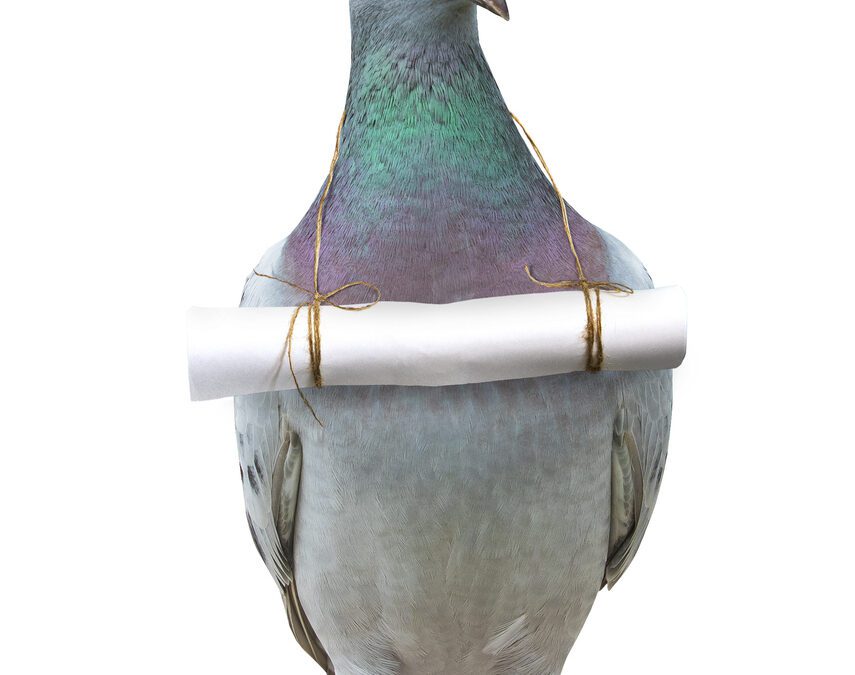
by Pigeon Patrol | Oct 15, 2024 | Bird Netting, Bird Spikes, Columbidae, Doves
A woman has expressed her disgust at the amount of ‘dead pigeons, droppings and shed feathers’ scattered across a railway bridge not far from Reading Station.
The railway line goes directly over Caversham Road taking trains to and from Reading along the Great Western Railway, with two lanes, traffic going in two directions and walkways on either side.
The bridge has become a popular roost for pigeons. This had led the regular user of this walkway to complain that it is ‘constantly covered in pigeon poo and corpses’.
Photos show a deceased bird on the concrete, the walkways covered in a mix of feathers and bird mess, and pigeons roosting despite netting being placed under the bridge in an attempt to ward them off. The woman, who lives nearby, said: “I’ve lived in Swansea Road for six and a bit years, and it’s got worse for three to four years.
“The netting under the bridge is torn and fallen down.
“The bridge should be chicken-wired. “There’s pigeon faeces running down the walls, and dead and dying birds on the pavement and the road.
“There’s often baby birds sitting on the pavement dying, it’s just really disgusting.
“When it rains the water mixes with the droppings, so you have liquid faeces dropping on people under the bridge. You have to use an umbrella.
“There are some pigeon spikes there but they’re not effective. “It’s just really grim.”

Mature gay couple feeding pigeons during a travel in Colombia
A dead pigeon seen at the Caversham Road railway underpass. She added she has reported the situation to the council’s Love Clean Reading app. However, she said just cleaning the footpath is not a solution. The woman continued: “Because it’s not blocked off, the pigeons can make nesting sites there.
“Although it’s an ideal habitat for them, this is not a healthy place for them to live, and it’s not healthy for us either. “I helped a woman who fell and tore her hand recently, I just hope she doesn’t get a nasty infection, because it’s filthy down there.” She then called for the bridge to be more thoroughly secured to dissuade the pigeons from nesting there.
The nets have not prevented pigeons roosting under the bridge over Caversham Road in Reading. When asked what could be done to rectify the issue, councillor Tony Page (Labour, Abbey) lead for transport, said: “The bridge structure and the pigeon netting above falls under the responsibility of Network Rail.
“The council’s street cleansing team regularly clean the footway below. “We understand that Network Rail has funding for an alternate solution to the netting and a scheme is currently being designed with a view to deliver this financial year. “We will support by providing the traffic management and lane closures to facilitate their works.
“The new solution should resolve issue on the footpath on both sides.” The concrete is caked in pigeon droppings and feathers as people walk through the Caversham Road Underpass. Credit: UGC
A spokesperson for Network Rail confirmed that netting under the bridge will be replaced. The spokesperson said: “We take our impact on the environment and our local communities seriously.
“We regularly inspect the condition of our infrastructure including deterrent measures such as the pigeon netting underneath Caversham Road bridge.
“We have agreed with Reading Borough Council that we will replace the existing netting with a new, more effective system and are working with our contractors to design this new system and agree a programme timeline for its installation.”
Pigeon Patrol Products & Services is the leading manufacturer and distributor of bird deterrent (control) products in Canada. Pigeon Patrol products have solved pest bird problems in industrial, commercial, and residential settings since 2000, by using safe and humane bird deterrents with only bird and animal -friendly solutions. At Pigeon Patrol, we manufacture and offer a variety of bird deterrents, ranging from Ultra-flex Bird Spikes with UV protection, Bird Netting, 4-S Bird Gel and the best Ultrasonic and audible sound devices on the market today.
Canada’s top wholesaler for bird deterrent products for twelve consecutive years.
Contact us at 1- 877– 4– NO-BIRD, (604) 585-9279 or visit our website at https://www.pigeonpatrol.ca/
Bird Gone, Pigeon Gone, Pigeon problems, pigeon spikes, 1-877-4NO-BIRD, 4-S Gel, Bird Control, Pigeon Control, bird repellent, Bird Spikes, sonic bird repellent, stainless steel bird spikes, bird spikes Vancouver, Ultra Sonic Bird Control, Bird Netting, Plastic Bird Spikes, Canada bird spike deterrents, Pigeon Pests, B Gone Pigeon, Pigeon Patrol, pest controller, pest control operator, pest control technician, Pigeon Control Products, humane pigeon spikes, pigeon deterrents, pigeon traps, Pigeon repellents, Sound & Laser Deterrents, wildlife control, raccoon, skunk, squirrel deterrent, De-Fence Spikes, Dragons Den, Pigeon, Pigeon Patrol, Pigeons Roosting, Vancouver Pigeon Control, Bird Spikes, Bird Control, Bird Deterrent, Pigeon Deterrent, Surrey Pigeon Control, Pest, Seagull deterrent Vancouver Pigeon Blog, Birds Inside Home De-fence, Pigeon Nesting, Bird Droppings, Pigeon Dropping, woodpecker control, Keep The Birds Away, Birds/rats, seagull, pigeon, woodpecker, dove, sparrow, pidgeon control, pidgeon problem, pidgeon control, flying rats, pigeon Problems, bird netting, bird gel, bird spray, bird nails, bird guard, Pigeon control, Bird deterrents, Pigeon deterrents, Bird control, solutions, Pigeon prevention, Pigeon repellent, Bird proofing, Pest bird management, Pigeon spikes, Bird netting, Humane bird control, Bird exclusion, Urban bird control, Anti-roosting devices, Pigeon removal, Bird barriers
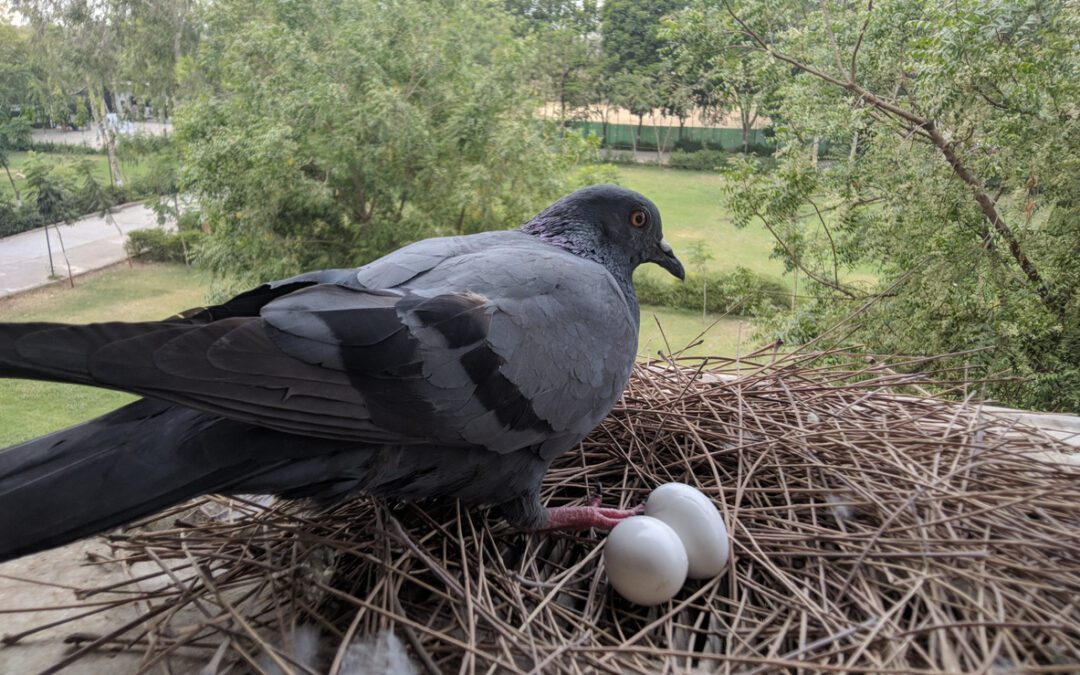
by Pigeon Patrol | Sep 25, 2024 | Bird Netting, Columbidae, Doves
I live in an apartment building on the top floor and had some pigeons decide to nest on my balcony since I hadn’t really been out there due to work and the weather wasn’t very nice. A pair of pigeons had laid some eggs, I let them use the space thinking that after the birds could fly, they would all just move along since I began using the balcony again. I would make sure to go out there frequently just to make sure that they were aware of me being there, and it would scare them off.
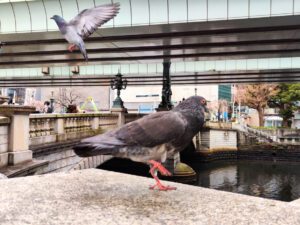
Pigeons by the iconic Nihonbashi bridge, designed by Tsumaki Yorinaka and constructed of stone on a steel frame, dates from 1911. Tokyo, Japan.
Well the first batch left the nest a while ago, but the birds werent scared off, and laid another set of eggs. The second set have already grown to where they can fly, and now I go out to scare them off every so often. I remove any nesting material that they lay down, but they are persistent and rebuild and try to lay eggs again. They laid a third set of eggs, which was the last straw for me, I took the eggs, and put them out in the courtyard where the birds could see them on the ground floor, thinking that they would attempt to find a more suitable location. They were in the same spot for a couple of days, and then they were gone. I am assuming the gardener probably removed them and not the birds.
Again the birds have tried to nest and lay eggs, this time there was only one, and I removed it and placed it on the ground level immediately. I go out every so ofte to scare them off, but they are there the next day.
I have thrown out almost all of the things that were on my patio since they were in such bad shape, and there is feces all over my balcony. I initially tried spraying vinegar thinking that the birds would not like the odor, it worked for about 30 minutes, and then the balcony actually just smelled better, and they probably liked it more.
I am trying to find a humane way to let the pigeons know that they are not welcome here, and ran across your website when I was looking for a safe way to remove them. The area has alot of debris and such from garbage that they eat from, and there are alot of places that they can nest, I am not trying to remove them from the entire area, just keeping them off my balcony. One website mentioned that the use of strong spices such as garlic, cinnamon, cayenne, and black pepper would be a good detterent, and I figured I would ask here if this is a good method, or if there is another solution to my problem. The property I live in does not want any visible things displayed on the balcony, so it would be difficult for some of the other ideas I have read, as far as shiny mobiles, or string to disrupt perches.
Pigeon Patrol
Pigeon Patrol Products & Services is the leading manufacturer and distributor of bird deterrent (control) products in Canada. Pigeon Patrol products have solved pest bird problems in industrial, commercial, and residential settings since 2000, by using safe and humane bird deterrents with only bird and animal -friendly solutions. At Pigeon Patrol, we manufacture and offer a variety of bird deterrents, ranging from Ultra-flex Bird Spikes with UV protection, Bird Netting, 4-S Bird Gel and the best Ultrasonic and audible sound devices on the market today.
Canada’s top wholesaler for bird deterrent products for twelve consecutive years.
Contact us at 1- 877– 4– NO-BIRD, (604) 585-9279 or visit our website at https://www.pigeonpatrol.ca/
Bird Gone, Pigeon Gone, Pigeon problems, pigeon spikes, 1-877-4NO-BIRD, 4-S Gel, Bird Control, Pigeon Control, bird repellent, Bird Spikes, sonic bird repellent, stainless steel bird spikes, bird spikes Vancouver, Ultra Sonic Bird Control, Bird Netting, Plastic Bird Spikes, Canada bird spike deterrents, Pigeon Pests, B Gone Pigeon, Pigeon Patrol, pest controller, pest control operator, pest control technician, Pigeon Control Products, humane pigeon spikes, pigeon deterrents, pigeon traps, Pigeon repellents, Sound & Laser Deterrents, wildlife control, raccoon, skunk, squirrel deterrent, De-Fence Spikes, Dragons Den, Pigeon, Pigeon Patrol, Pigeons Roosting, Vancouver Pigeon Control, Bird Spikes, Bird Control, Bird Deterrent, Pigeon Deterrent, Surrey Pigeon Control, Pest, Seagull deterrent Vancouver Pigeon Blog, Birds Inside Home De-fence, Pigeon Nesting, Bird Droppings, Pigeon Dropping, woodpecker control, Keep The Birds Away, Birds/rats, seagull, pigeon, woodpecker, dove, sparrow, pidgeon control, pidgeon problem, pidgeon control, flying rats, pigeon Problems, bird netting, bird gel, bird spray, bird nails, bird guard, Pigeon control, Bird deterrents, Pigeon deterrents, Bird control, solutions, Pigeon prevention, Pigeon repellent, Bird proofing, Pest bird management, Pigeon spikes, Bird netting, Humane bird control, Bird exclusion, Urban bird control, Anti-roosting devices, Pigeon removal, Bird barriers

by Pigeon Patrol | Sep 25, 2024 | Bird Law, Bird Netting, Bird Spikes, Columbidae, Doves
The Pink Pigeon is no longer Endangered. But how did conservationists achieve this, and is it sustainable? Dr Vikash Tatayah, Conservation Director, Mauritian Wildlife Foundation (BirdLife Partner) reports from the field…
Last year, one of Mauritius’ best-loved birds hit a milestone that delighted the conservation world. In the 2018 Red List update, the Pink Pigeon Nesoenas mayeri was downlisted from Endangered to Vulnerable, building upon the success of 2000, when it was downlisted from Critically Endangered to Endangered. But behind the scenes of this happy news lies over 30 years of gruelling devotion, with conservationists tackling the numerous threats to the pigeon from every possible angle in their bid to bring it back from the brink.
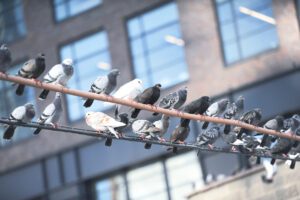
Pigeons in the city
For a while, we were worried it might go the same way as its fellow Mauritian endemic, the Dodo Raphus cucullatus. An even closer relative, the Reunion Pigeon Nesoenas duboisi, went extinct on the neighbouring Reunion Island in the late 18th century thanks to introduced cats and rats. The Pink Pigeon now holds the unenviable title of the last native pigeon in the whole Mascarene archipelago.
Predictably, it was the arrival of humans that heralded the Pink Pigeon’s decline. The species was once widely distributed across Mauritius, but by the 19th century its population had become extremely fragmented and confined to the upland forests. Humans had destroyed native vegetation to the extent that only 1.5% of the original, good-quality forest remained. They also hunted the plump bird and introduced a panoply of predators such as Black Rat Rattus rattus, Small Indian Mongoose Herpestes auropunctatus and Crab-eating Macaque Macaca fascicularis.
It wasn’t just animal predators: what little forest remained was soon invaded by non-native plants such as Chinese Guava Psidium cattleianum and the privet species Ligustrum robustum which choke vegetation, preventing the regeneration of native plants. By the mid-1970s, the species had plummeted to a single population of 20 birds in the upland forest of Black River Gorges, an area now known as Pigeon Wood. Just 12 Pink Pigeons remained in 1986, and of the five nesting attempts recorded that year, all were thwarted by rats. The wild population hit an all-time low of nine birds in 1990. The chances for long-term survival of the species looked bleak.
But the Mauritian Wildlife Foundation wasn’t going to let it go without a fight. With help from organisations across the world [see With Thanks, below], we set up an intensive conservation programme starting with captive breeding set up in 1976, followed by the first wild releases in 1987. We now have nine subpopulations centred around our field stations. Six of these are within the Black River Gorges National Park, close to the original Pigeon Wood. A sub-population can be found on the predator-free nature reserve island Ile aux Aigrettes, and two additional subpopulations are being created on private land at Ferney on the east of Mauritius and in Chamarel Ebony Forest in the south west. The purpose of these captive-reared birds is to bolster wild populations, and we encourage the dispersal of birds between the different areas in order to maintain genetic diversity. In total we now have 470 wild Pink Pigeons at these sites, a dramatic improvement compared to the species’ darkest hour.
Captive-bred chicks like these are released to bolster wild populations © MWF
But captive-breeding won’t help unless the wild habitat is made safe for these newcomers. That’s why wild populations are carefully managed using a three-pronged technique. Firstly, every Pink Pigeon is ringed with its own metal ID band and unique plastic colour combination. Each bird can therefore be identified and followed individually. All nests are checked regularly and the results documented. A large dataset has now been collected and continues to grow. This precise information helps us to understand in more depth the factors affecting the survival of the Pink Pigeon, and how to shape our management strategies accordingly.
Another priority is food. The Pink Pigeon is herbivorous, feeding mainly on fruit, leaves and flowers. But its natural habitat is so degraded that the birds are often unable to find enough food to support themselves. In order to supplement their diet, whole wheat and cracked maize is provided at each of the field sites. The food is placed on specially-designed platforms to prevent other species from obtaining it.
Introduced predators are, without a doubt, a major limiting factor to the survival of this species. Much energy is devoted to removing or controlling them from around the field sites. We are also researching and tackling diseases, in particular trichomonosis, an illness introduced by alien pigeons that can be especially fatal to Pink Pigeon chicks.
In the long term, large areas of forest will need to be restored so that the Pink Pigeon can spread into the uplands and breed in safe nesting sites with fewer predators. But for now, we are working on reinforcing numbers at the recently-created release sites. In order to increase genetic diversity, birds from captive populations in Europe will be repatriated to Mauritius. Research has shown that these birds have genetic variations no longer found in the wild population.
We are constantly seeking to improve our knowledge of the Pink Pigeon’s biology and behaviour, conducting studies into factors limiting the recovery of this species. We have examined the fruiting and flowering of plants that the pigeons feed on which, combined with feeding observations, will enable us to tailor our supplementary feeding more precisely. Ultimately, we have high hopes that all of these measures should enable us to meet our target of 600 wild Pink Pigeons in the next decade.
The future looks bright for other species, too. When working out how to save the Pink Pigeon, some techniques were inspired by previous pigeon rearing projects, but others have been perfected or developed on Mauritius. We can now pass these new techniques on to the rest of the world to help others restore threatened pigeons worldwide. Hundreds of field biologists trained in our methods have gone on to work in important conservation positions elsewhere. They now have the ability to disseminate what they learned globally, ensuring the Pink Pigeon’s success can spread beyond Mauritius’ borders.
Pigeon Patrol
Pigeon Patrol Products & Services is the leading manufacturer and distributor of bird deterrent (control) products in Canada. Pigeon Patrol products have solved pest bird problems in industrial, commercial, and residential settings since 2000, by using safe and humane bird deterrents with only bird and animal -friendly solutions. At Pigeon Patrol, we manufacture and offer a variety of bird deterrents, ranging from Ultra-flex Bird Spikes with UV protection, Bird Netting, 4-S Bird Gel and the best Ultrasonic and audible sound devices on the market today.
Canada’s top wholesaler for bird deterrent products for twelve consecutive years.
Contact us at 1- 877– 4– NO-BIRD, (604) 585-9279 or visit our website at https://www.pigeonpatrol.ca/
Bird Gone, Pigeon Gone, Pigeon problems, pigeon spikes, 1-877-4NO-BIRD, 4-S Gel, Bird Control, Pigeon Control, bird repellent, Bird Spikes, sonic bird repellent, stainless steel bird spikes, bird spikes Vancouver, Ultra Sonic Bird Control, Bird Netting, Plastic Bird Spikes, Canada bird spike deterrents, Pigeon Pests, B Gone Pigeon, Pigeon Patrol, pest controller, pest control operator, pest control technician, Pigeon Control Products, humane pigeon spikes, pigeon deterrents, pigeon traps, Pigeon repellents, Sound & Laser Deterrents, wildlife control, raccoon, skunk, squirrel deterrent, De-Fence Spikes, Dragons Den, Pigeon, Pigeon Patrol, Pigeons Roosting, Vancouver Pigeon Control, Bird Spikes, Bird Control, Bird Deterrent, Pigeon Deterrent, Surrey Pigeon Control, Pest, Seagull deterrent Vancouver Pigeon Blog, Birds Inside Home De-fence, Pigeon Nesting, Bird Droppings, Pigeon Dropping, woodpecker control, Keep The Birds Away, Birds/rats, seagull, pigeon, woodpecker, dove, sparrow, pidgeon control, pidgeon problem, pidgeon control, flying rats, pigeon Problems, bird netting, bird gel, bird spray, bird nails, bird guard, Pigeon control, Bird deterrents, Pigeon deterrents, Bird control, solutions, Pigeon prevention, Pigeon repellent, Bird proofing, Pest bird management, Pigeon spikes, Bird netting, Humane bird control, Bird exclusion, Urban bird control, Anti-roosting devices, Pigeon removal, Bird barriers
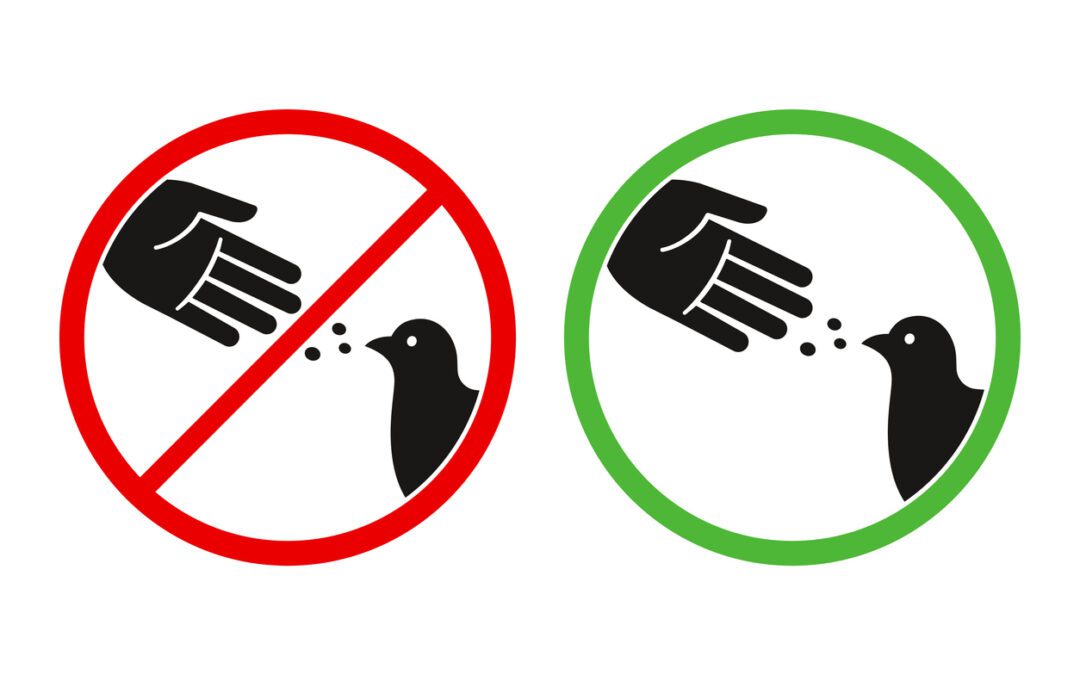
by Pigeon Patrol | Sep 25, 2024 | Bird Netting, Doves, Raccoons, Sparrows
I have pigeons. They are living 21 stories above the city on a small terrace that I don’t use much in the winter, behind a large urn holding a bare lilac bush, sitting on a small table. It is a very small space that they inhabit — I’m not sure how many there are. Three, at least. Sometimes it’s like a clown car and more stream out.
What are they doing there, and why don’t pigeons fly south like other birds?
First of all, I learned, “when birds migrate during the fall, they’re not looking for warmer weather – they’re looking for food, which New York City is full of,” NYC

Young girl at Placa de Catalunya jumping happily among the pigeons
Second, like all true New Yorkers, pigeons like people; you have to on some level to live here. After thousands of years of interaction, they are accustomed to us. “Where there [are] people, there [are] going to be pigeons,” Rodriguez said.
My pigeons fluff up their feathers when they step from behind the urn. “If you’ve ever seen a pigeon or any bird fluffing up, they’re actually increasing the efficiency of their feathers’ insulating abilities,” Rodriguez explained.
Birds also secrete an oil that coats their feathers to keep them warm, and their feet have special scales that protect against the cold. “If all of that isn’t enough to keep a pigeon warm, they can restrict blood flow to any areas of the body that are exposed to the cold,” WPIX11 adds.
What about droppings? There are many, along with loose feathers, and they don’t make me happy. Pigeons have a reputation for being dirty. I read that, very rarely, humans can catch diseases from the dust of pigeon droppings when trying to clean them up. The risk is higher, as is true of everything these days, for people who are immunocompromised.
I’m not sure how I feel about my pigeons. I’ll admit, I was tempted to scatter some seed for them, but resisted, fearing unintended consequences.
Anyone else have pigeons or birds of any kind — and, perhaps, some advice?
Pigeon Patrol
Pigeon Patrol Products & Services is the leading manufacturer and distributor of bird deterrent (control) products in Canada. Pigeon Patrol products have solved pest bird problems in industrial, commercial, and residential settings since 2000, by using safe and humane bird deterrents with only bird and animal -friendly solutions. At Pigeon Patrol, we manufacture and offer a variety of bird deterrents, ranging from Ultra-flex Bird Spikes with UV protection, Bird Netting, 4-S Bird Gel and the best Ultrasonic and audible sound devices on the market today.
Canada’s top wholesaler for bird deterrent products for twelve consecutive years.
Contact us at 1- 877– 4– NO-BIRD, (604) 585-9279 or visit our website at https://www.pigeonpatrol.ca/
Bird Gone, Pigeon Gone, Pigeon problems, pigeon spikes, 1-877-4NO-BIRD, 4-S Gel, Bird Control, Pigeon Control, bird repellent, Bird Spikes, sonic bird repellent, stainless steel bird spikes, bird spikes Vancouver, Ultra Sonic Bird Control, Bird Netting, Plastic Bird Spikes, Canada bird spike deterrents, Pigeon Pests, B Gone Pigeon, Pigeon Patrol, pest controller, pest control operator, pest control technician, Pigeon Control Products, humane pigeon spikes, pigeon deterrents, pigeon traps, Pigeon repellents, Sound & Laser Deterrents, wildlife control, raccoon, skunk, squirrel deterrent, De-Fence Spikes, Dragons Den, Pigeon, Pigeon Patrol, Pigeons Roosting, Vancouver Pigeon Control, Bird Spikes, Bird Control, Bird Deterrent, Pigeon Deterrent, Surrey Pigeon Control, Pest, Seagull deterrent Vancouver Pigeon Blog, Birds Inside Home De-fence, Pigeon Nesting, Bird Droppings, Pigeon Dropping, woodpecker control, Keep The Birds Away, Birds/rats, seagull, pigeon, woodpecker, dove, sparrow, pidgeon control, pidgeon problem, pidgeon control, flying rats, pigeon Problems, bird netting, bird gel, bird spray, bird nails, bird guard, Pigeon control, Bird deterrents, Pigeon deterrents, Bird control, solutions, Pigeon prevention, Pigeon repellent, Bird proofing, Pest bird management, Pigeon spikes, Bird netting, Humane bird control, Bird exclusion, Urban bird control, Anti-roosting devices, Pigeon removal, Bird barriers
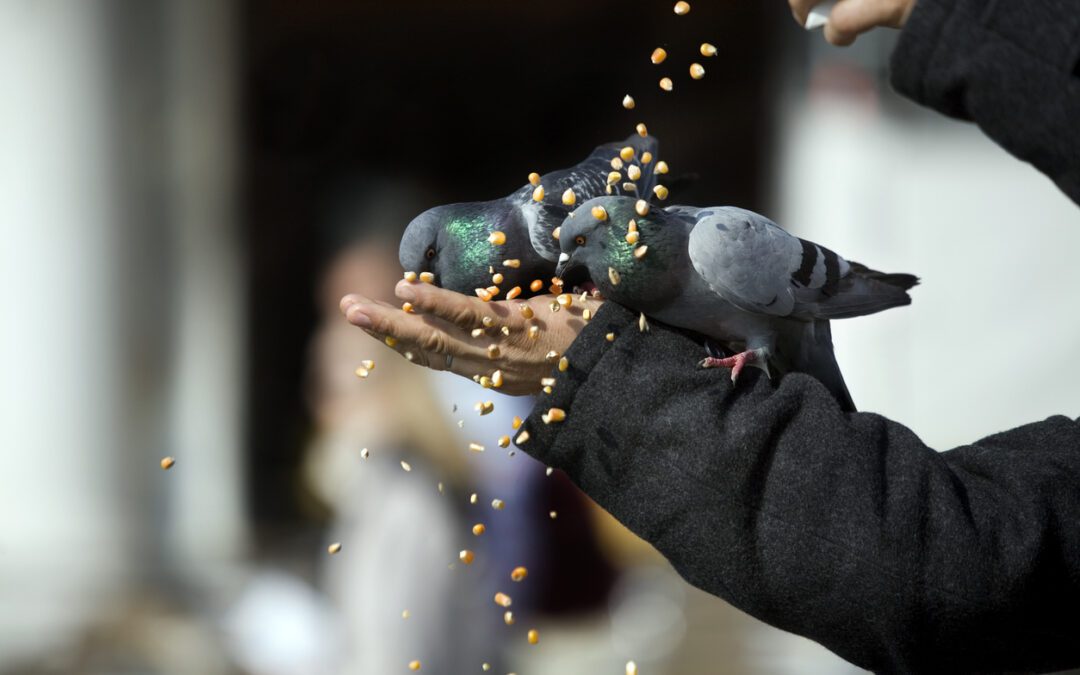
by Pigeon Patrol | Sep 25, 2024 | Bird Netting, Bird Spike, Columbidae, Doves, Pigeon Spikes, Pigeons in the News, Raccoons
Pigeons are one of the few species of wild animal with which town and city dwellers have regular contact, so they are popular with a lot of people. However, the cost of cleaning their droppings from buildings and statues can be considerable and pigeon welfare can be adversely affected by overcrowding.

Bosphorus in İstanbul,Turkey.
There are many places world-wide where attempts have been made to control pigeons by culling. Culling methods have included poisoning, shooting with air rifles and trapping. However, modern scientific research (1) shows that culling is completely ineffective, as bird numbers can increase above pre-cull levels within weeks of the cull being carried out.
Why is culling promoted?
Pest control companies are fully aware that culling is ineffective but they continue to recommend this option because it ensures that they will be offered a lucrative long-term contract.
Why is culling ineffective?
In areas where culling is carried out, there will be an initial reduction in pigeon numbers. However, this effect is very short term as the population will almost certainly have returned to or even exceeded the previous level within a few weeks. This is because pigeons control their own numbers according to the food source available.
Approximately 90% of pigeons die in their first year and the main cause of death is starvation. The mortality rate of adult pigeons is very low, typically around 11% (2). Therefore when culling is carried out on a pigeon population, the vacancies left by the dead birds are quickly filled by young birds.
This means that killing adult pigeons in a flock discriminates in favour of young birds who would otherwise have perished. It has no long-term effect on the level of population, as it merely rejuvenates the flock.
A culling programme was carried out in Basel, Switzerland; a city which had a population of approximately 20,000 pigeons. From 1961-85, 100,000 pigeons were culled by shooting and trapping. Despite this, the population remained stable.
In 1988 a group called Pigeon Action was founded to establish an ecological and long term solution to the city’s pigeon issue. They began a programme of public education campaigns which warned against feeding pigeons and installed pigeon lofts from which eggs were removed. As a result, the population was halved within four years.
Other arguments against culling
Culling is an extremely expensive option, as a long-term contract with pest controllers will have to be entered into because regular repeat culls will be necessary. Culling by poison puts other species at risk because it is both indiscriminate and because poisoned birds will affect other animals in the food chain. Cats and birds of prey may consume poisoned pigeons with fatal results.
Narcotics have been used to stupefy pigeons and make them easier to catch. However, this culling method can have disastrous consequences, with drugged birds disrupting traffic and smashing into buildings. This happened in Perth, Australia in 1999. Narcotics and poison are both very inhumane as the pigeons taking the bait will die slowly and may suffer dehydration and hypothermia.
Shooting is a widely-used culling method which also results in suffering as the majority of birds shot are wounded, rather than killed. There have been many reports of injured birds being thrown into bin bags or stamped upon by pest control operatives. Young chicks are also left to slowly perish.
Trapping of pigeons is also widespread. Apart from the risk that trapped birds are sometimes left to die from exposure, this culling method is also very time-consuming and expensive.
What are the alternatives?
There are three approaches to pigeon control which do not involve culling. They are the use of deterrents, the installation of artificial nesting sites and public education campaigns.
Deterrents
Deterrents such as spikes, holograms of owls’ eyes and wire systems can be very effective at preventing pigeons from roosting on buildings.
Netting is often used on buildings, but it can result in young flightless birds being trapped behind it and flying birds can become tangled and injured. The RSPCA and wildlife groups receive thousands of reports every year of pigeons and other birds trapped by netting.
Trained raptors (birds of prey) have been used in some areas to drive away pigeons. These birds are trained to chase, but not kill pigeons and can successfully drive a flock elsewhere. In some enclosed sites, such as railway stations, the use of raptors can be extremely effective. However, this method is expensive and will only work on a specific site, so is unsuitable for large areas.
The use of falconry to control pigeons involves pigeons being caught and killed. Nottingham City Council tried this method in 1999 but the sight of pigeons being attacked by the bird resulted in public distress, lots of negative publicity and cost thousands of pounds, whilst having no overall effect on pigeon numbers.
The problem with all deterrent methods is that the pigeons driven away from one site will simply re-locate to another, equally unsuitable site. Therefore, this form of control has limited use unless employed in conjunction with other methods.
Artificial Nesting Sites
Dovecotes or nesting boxes can be constructed and installed for a low, one-off cost. Once the pigeons have been encouraged to roost in these sites, their eggs can be collected regularly and destroyed. This is a simple, fast and very effective way to reduce pigeon numbers. It is also humane, as no killing is involved. Another advantage of dovecotes or nesting boxes is that they provide a way to move pigeon flocks away from sites where they are considered a nuisance to sites where they will pose no problems. Designated feeding areas can then be set up for public use.
Public Education Campaigns
The only effective long-term method of reducing pigeon populations is to manipulate their environment in such a way that they can no longer eat or roost easily. Each breeding pair can produce up to ten chicks per year if they have an abundant food supply, but if available food is reduced, their breeding rate slows down and can even stop altogether.
Large numbers of people regularly feed pigeons in the belief that they are caring for the birds. Litter also provides an abundant food supply to pigeons in towns and cities. As the mortality rate of adult pigeons is so low, there is strong competition for food and breeding sites.
Pigeon overpopulation is caused by large quantities of food being provided by the public. Therefore, it is essential to educate people to either stop feeding pigeons or to do so in designated areas near artificial nesting sites.
In Basel, Pigeon Action embarked on a campaign to convince the public that feeding pigeons harms them, as it causes overpopulation. They produced leaflets and posters and distributed them widely. These featured pictures of baby pigeons infected by diseases and pushed the point that overcrowding is bad for pigeons as well as people.
A successful publicity campaign will result in a large reduction in people feeding pigeons and will impose a very effective limit to their population size. Sheffield City Council produced colour leaflets which explained clearly to people why they should stop feeding pigeons. Leaflets such as these, together with signs in the relevant places should ensure that the message gets through.
Case studies
Nottingham City Hospital
Following a visit from Guy Merchant of PICAS in May 2000, the hospital suspended lethal culling of pigeons.
An on-site pest controller was employed, who proofed many sensitive areas and installed nest boxes on several large flat roofs which were heavily populated by pigeons. These were made from recycled staff lockers. The pigeons were then provided with food, water and nesting materials near the boxes in order to encourage the birds to roost there. The pest-controller visited these roosting sites daily in order to remove eggs. Hatchlings were left alone.
The result: “The impact on the trust has been dramatic. In less than a year, the bird population has reduced by an estimated 50%. The cost of cleaning fouling has also reduced significantly.” Statement made in March 2001 by Clive Young, Environmental Services Manager at Nottingham City Hospital NHS Trust.
Barking and Dagenham District Council
As a result of public pressure, this Council decided to explore alternatives to culling pigeons. A colour leaflet was produced which urged the public not to feed pigeons and to dispose of food litter properly.
Council properties, including high-rise flats were proofed in order to reduce the potential breeding sites available to the pigeons. In July 2000 a dovecote was opened in the park which had been identified as the main public feeding site. This generated a lot of very positive publicity.
This Council took some very positive action to reduce pigeon numbers, but their dovecote was designed with aesthetic appearance as the priority, rather than its attractiveness to pigeons and many nearby buildings were not proofed.
Railtrack
Railtrack abandoned culling at London mainline stations in 1999 and began to employ the services of a trained raptor and handler, as advised by PICAS. This proved extremely successful and other train operators are now exploring this option.
Summary
Lethal control of pigeons by culling has been consistently shown to have no long-term effect on population levels. It is also expensive, inhumane and can result in very negative publicity. Extensive research and recent case studies have shown that the use of artificial breeding sites, combined with egg removal, proofing of buildings and public education campaigns can result in a long term reduction of pigeon populations by as much as 50% within months. These control methods are humane, cost-efficient and will generate positive publicity.
The feral pigeon is descended from the rock dove whose natural habitat is cliffs and caves. Large buildings and statues offer pigeons roosting sites which closely resemble these. This, combined with their resourcefulness, tendency to scavenge and lack of territorial aggression has led to large flocks of pigeons living in close proximity with people.
Although it is widely believed that pigeons carry and spread diseases to people, there is very little evidence that pigeons jeopardise human health. (3) Pigeon lung disease is an allergic reaction which affects some people who have prolonged contact with pigeons in confined places. It is easily treated if diagnosed early and can be avoided by wearing a mask if in contact with pigeons in a dusty environment.
Pigeon Patrol
Pigeon Patrol Products & Services is the leading manufacturer and distributor of bird deterrent (control) products in Canada. Pigeon Patrol products have solved pest bird problems in industrial, commercial, and residential settings since 2000, by using safe and humane bird deterrents with only bird and animal -friendly solutions. At Pigeon Patrol, we manufacture and offer a variety of bird deterrents, ranging from Ultra-flex Bird Spikes with UV protection, Bird Netting, 4-S Bird Gel and the best Ultrasonic and audible sound devices on the market today.
Canada’s top wholesaler for bird deterrent products for twelve consecutive years.
Contact us at 1- 877– 4– NO-BIRD, (604) 585-9279 or visit our website at https://www.pigeonpatrol.ca/
Bird Gone, Pigeon Gone, Pigeon problems, pigeon spikes, 1-877-4NO-BIRD, 4-S Gel, Bird Control, Pigeon Control, bird repellent, Bird Spikes, sonic bird repellent, stainless steel bird spikes, bird spikes Vancouver, Ultra Sonic Bird Control, Bird Netting, Plastic Bird Spikes, Canada bird spike deterrents, Pigeon Pests, B Gone Pigeon, Pigeon Patrol, pest controller, pest control operator, pest control technician, Pigeon Control Products, humane pigeon spikes, pigeon deterrents, pigeon traps, Pigeon repellents, Sound & Laser Deterrents, wildlife control, raccoon, skunk, squirrel deterrent, De-Fence Spikes, Dragons Den, Pigeon, Pigeon Patrol, Pigeons Roosting, Vancouver Pigeon Control, Bird Spikes, Bird Control, Bird Deterrent, Pigeon Deterrent, Surrey Pigeon Control, Pest, Seagull deterrent Vancouver Pigeon Blog, Birds Inside Home De-fence, Pigeon Nesting, Bird Droppings, Pigeon Dropping, woodpecker control, Keep The Birds Away, Birds/rats, seagull, pigeon, woodpecker, dove, sparrow, pidgeon control, pidgeon problem, pidgeon control, flying rats, pigeon Problems, bird netting, bird gel, bird spray, bird nails, bird guard, Pigeon control, Bird deterrents, Pigeon deterrents, Bird control, solutions, Pigeon prevention, Pigeon repellent, Bird proofing, Pest bird management, Pigeon spikes, Bird netting, Humane bird control, Bird exclusion, Urban bird control, Anti-roosting devices, Pigeon removal, Bird barriers
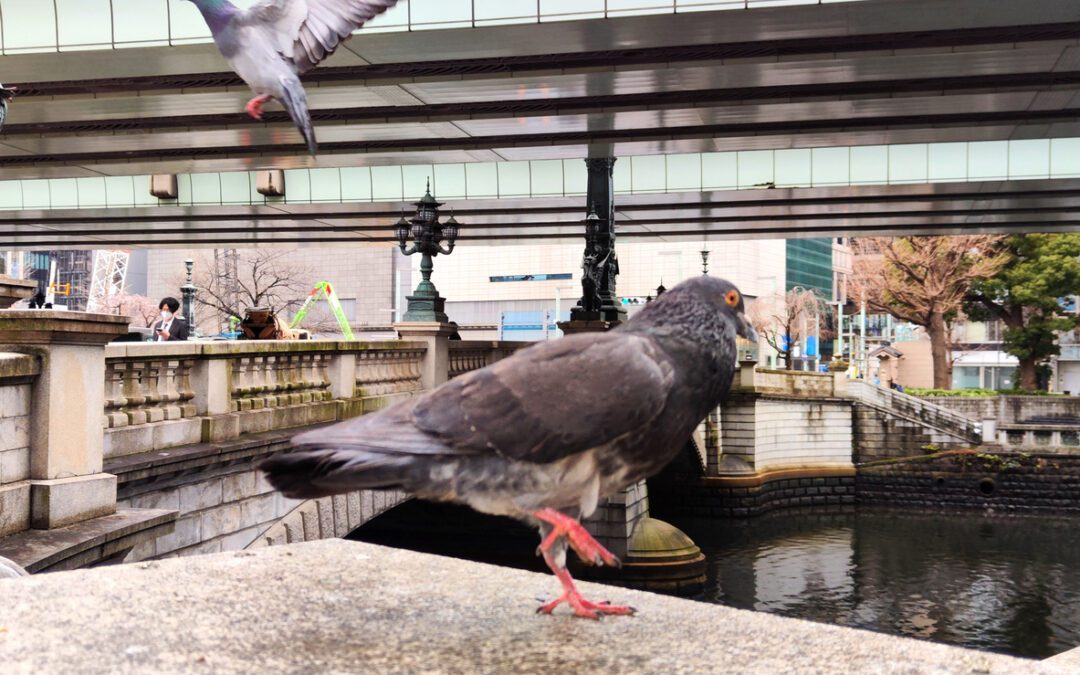
by Pigeon Patrol | Sep 19, 2024 | Bird Spikes, Columbidae, Doves
Passenger pigeons, so abundant during the early 19th century that skies darkened with passing flocks, may often have been nothing special in numbers during much of their last million years.
DNA from the extinct species, coaxed from toe pads of three museum specimens, suggests that population numbers fluctuated in the long term. The breeding population could have been at times only roughly several hundred thousand or even just tens of thousands of birds, says Chih-Ming Hung of National Taiwan Normal University in Taipei.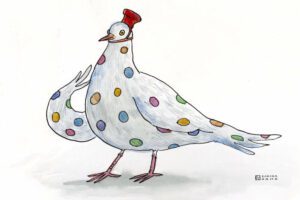
That’s a surprise. A survey of various other animals suggests that the size of the breeding population, like that pulled from the pigeon DNA, is typically about one-tenth of the whole population, Hung says. Yet the estimates of breeding populations in the new study are only one ten-thousandth of the 3 billion to 5 billion birds estimated in 19th-century eyewitness reports.
Hung doesn’t dispute those huge 19th century estimates. The DNA tells a story of bird numbers that soared and sank over time, he and his colleagues argue June 16 in the Proceedings of the National Academy of Sciences. He would need more analysis, he says, to see if an extreme crash during the most recent Ice Age would have produced such a skewed ratio in the last century. Or, in a more controversial scenario, he proposes that passenger pigeons may have had population booms and busts repeatedly on much shorter time scales.
Hung became curious about genetic trends of the passenger pigeon after a pivotal conversation several years ago regarding the 100th anniversary this September of the death of Martha, a passenger pigeon in the Cincinnati Zoo and the last known individual of the species.
Museum specimens’ toe pads provide the best picture yet of passenger pigeon genetics, Hung says. From the amount of variation the researchers found in the specimens’ DNA, they could work out an approximate number for the birds that were passing on their genes, called the effective population size.
Over the last million years, Hung and his colleagues found, the typical number of breeding birds could have averaged something like 330,000. Another method found lower numbers but a similarly small order of magnitude: 170,000 at the population’s height to perhaps 50,000 at its worst. The ups and downs over deep history fit with the timing of glacial cycles and with computer simulations of the niches available for the birds as climate changed.
Genetic tests can’t detect population ups and downs at the scale of a mere century. But Hung and his colleagues speculate that pigeon populations might have fluctuated in the short term too, perhaps shrinking drastically during times of skimpy acorns.
In theory, a species that surges in mind-boggling numbers certainly can go extinct quickly, says entomologist Jeffrey A. Lockwood of the University of Wyoming. The Rocky Mountain locust (Melanoplus spretus) is an example that savaged wide swaths of cropland during its booms but abruptly went extinct at the end of the 19th century when farmers took over the very specific habitats it needed to breed.
But passenger pigeons couldn’t have boomed in huge numbers quickly, says conservation biologist Stanley Temple of the University of Wisconsin–Madison. The birds tended just one nest a year and raised one chick. “There is absolutely no way these birds could rapidly increase their numbers,” he says. “It would take them probably centuries to increase their population even tenfold, let alone several orders of magnitude.”
Hung and critics agree that natural cycles, either short- or long-term, do not mean that the passenger pigeon would have eventually cycled into oblivion on its own. David Blockstein, senior scientist at the National Council for Science and the Environment in Washington, D.C., has described how intensive shooting at breeding colonies contributed to the species’ demise by disrupting its reproduction. And ecologist Stuart Pimm of Duke University says, “The basic cause for the passenger pigeon’s decline was the destruction of the Eastern forests.” The message of the paper, Hung says, is that “the passenger pigeon had repeatedly recovered from population lows throughout its history.” Then came 19th-century humans.
Pigeon Patrol
Pigeon Patrol Products & Services is the leading manufacturer and distributor of bird deterrent (control) products in Canada. Pigeon Patrol products have solved pest bird problems in industrial, commercial, and residential settings since 2000, by using safe and humane bird deterrents with only bird and animal -friendly solutions. At Pigeon Patrol, we manufacture and offer a variety of bird deterrents, ranging from Ultra-flex Bird Spikes with UV protection, Bird Netting, 4-S Bird Gel and the best Ultrasonic and audible sound devices on the market today.
Canada’s top wholesaler for bird deterrent products for twelve consecutive years.
Contact us at 1- 877– 4– NO-BIRD, (604) 585-9279 or visit our website at https://www.pigeonpatrol.ca/
Bird Gone, Pigeon Gone, Pigeon problems, pigeon spikes, 1-877-4NO-BIRD, 4-S Gel, Bird Control, Pigeon Control, bird repellent, Bird Spikes, sonic bird repellent, stainless steel bird spikes, bird spikes Vancouver, Ultra Sonic Bird Control, Bird Netting, Plastic Bird Spikes, Canada bird spike deterrents, Pigeon Pests, B Gone Pigeon, Pigeon Patrol, pest controller, pest control operator, pest control technician, Pigeon Control Products, humane pigeon spikes, pigeon deterrents, pigeon traps, Pigeon repellents, Sound & Laser Deterrents, wildlife control, raccoon, skunk, squirrel deterrent, De-Fence Spikes, Dragons Den, Pigeon, Pigeon Patrol, Pigeons Roosting, Vancouver Pigeon Control, Bird Spikes, Bird Control, Bird Deterrent, Pigeon Deterrent, Surrey Pigeon Control, Pest, Seagull deterrent Vancouver Pigeon Blog, Birds Inside Home De-fence, Pigeon Nesting, Bird Droppings, Pigeon Dropping, woodpecker control, Keep The Birds Away, Birds/rats, seagull, pigeon, woodpecker, dove, sparrow, pidgeon control, pidgeon problem, pidgeon control, flying rats, pigeon Problems, bird netting, bird gel, bird spray, bird nails, bird guard, Pigeon control, Bird deterrents, Pigeon deterrents, Bird control, solutions, Pigeon prevention, Pigeon repellent, Bird proofing, Pest bird management, Pigeon spikes, Bird netting, Humane bird control, Bird exclusion, Urban bird control, Anti-roosting devices, Pigeon removal, Bird barriers












